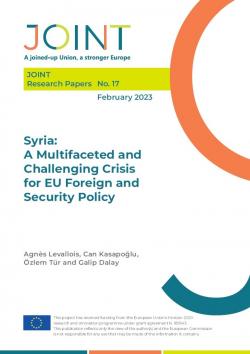Syria: A Multifaceted and Challenging Crisis for EU Foreign and Security Policy
The Syrian civil war has been among the most intractable crises for the EU. An interplay of multi-level domestic and regional fragmentation and multipolar competition has constrained the ability of the EU and its member states to impact events on the ground. Since 2011, the EU has tried to promote a political transition through a negotiated settlement. As the war has dragged on, pushing millions of Syrians to flee the country, the EU has stepped up humanitarian aid to the population and assistance to neighbouring countries hosting Syrian refugees. However, the resilience of the Assad regime, emboldened by the support of Russia and Iran, some disagreements between EU member states on how to break the stalemate and, more recently, the war in Ukraine, have limited the EU’s agency. The EU should build consensus ground amongst the member states for investing more diplomatic capital in Syria, including via a conditional engagement of Turkey, Iran and Russia and the Astana process.
-
Details
Rome, IAI, February 2023, 37 p. -
In:
-
Issue
JOINT Research Paper 17
Introduction
1. Syria’s place in regional politics before the civil war
2. The context of EU foreign and security policy towards Syria
2.1 The deepening fragmentation of Syria
2.2 Syria at the centre of regional competition
2.3 The war in Ukraine and its implications for Syria
3. EU policies and mitigation strategies
3.1 The heterogeneity of EU member states’ policies
3.2 EU policy tools: An overview
Migration
Aid
The fight against ISIS
The fight against drug trafficking
The results of EU policies
4. Policy recommendations
Conclusions
References



